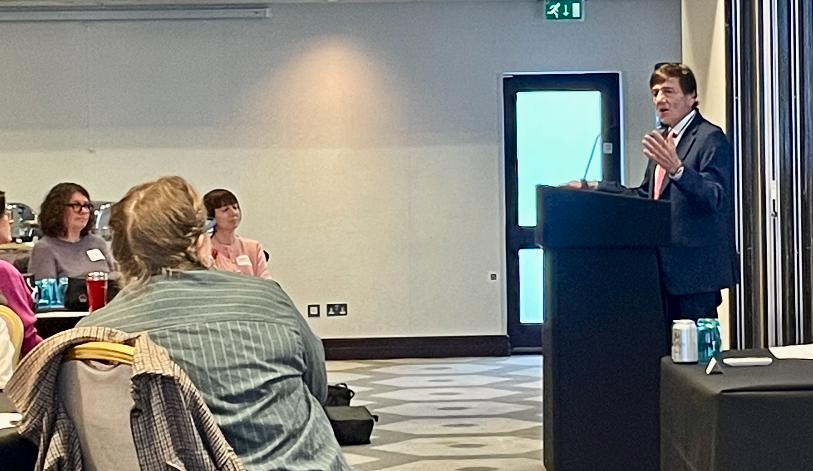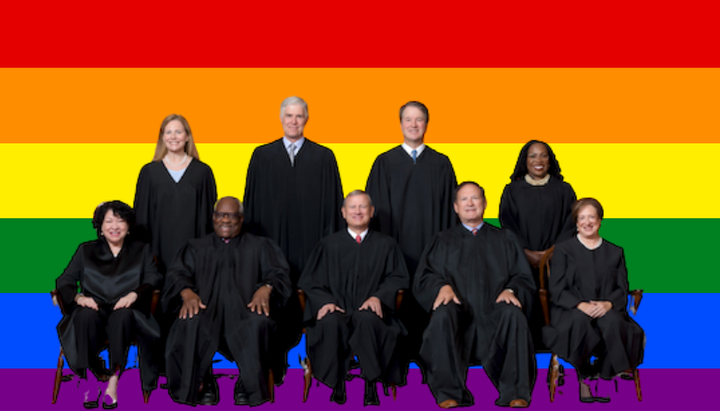The Queue: Library News for the Week Ending March 14
Among the week's headlines: At the London Book Fair, publisher optimism clashed with American political chaos; back home, a new Rhode Island bill seeks to protect the freedom to read; and incoming ALA president Sam Helmick speaks to the challenges facing librarians.

We’re back from a very busy London Book Fair, and grateful for the strong support we received for Words & Money during our soft launch. In fact, the support has been so strong that that we’re looking to see if we can accelerate the timeline to our official launch. A big thanks to everyone taking paid subscriptions at this early stage, your support will certainly help as we look to get things rolling. Again, we're building the road we're traveling on, and we ask for your patience. We'll be up to speed soon!
As for the London Book Fair—the first major fixture on the global publishing industry calendar—publishers actually had quite a bit to be encouraged about heading into the fair. Book sales appear to have stabilized after a few rollercoaster years. Digital audio sales continue to surge. And the pandemic-fueled supply chain disruptions and paper shortages of years past appear to be if not behind us then at least well-managed.
At the same time, however, publishers’ optimism was tempered by the political chaos unfolding in the United States. The prospect of tariffs and an ill-conceived Trump trade war has publishers walking on economic eggshells. More concerning, talk on the show floor was of the Trump’s ready embrace of authoritarianism, the ramped-up attacks on the rule of law, the free press and the media, public education, diversity efforts, and, shockingly, even the sovereignty of its allies in Canada and Greenland.
Publishers Weekly has a good roundup of the fair here, as well as a roundup of rights sales (which includes news of a deal to adapt Rebecca Yarros’s Empyrean series into a graphic novel series).
Notably, libraries were largely absent from the London Book Fair’s professional program, with just a handful of sessions dealing with library issues over the fair’s three days. But on Wednesday, March 12, leading library e-book platform OverDrive hosted a half-day event for some 100 U.K. librarians at the Hilton Olympia, next door to the fairgrounds. And while those sessions mainly focused on how U.K. librarians can get the most out of the OverDrive service, it quickly became clear that U.K. librarians are facing the same issues U.S. librarians are when it comes to digital access—high prices, excessively long hold times, and the need for more flexible options for licensing e-books and digital audio.
In his opening remarks, OverDrive CEO Steve Potash vowed to continue to advocate both for stronger library funding, and for fairer terms for library digital access. “There is no better champion for the future of [books] than the school librarian in every town,” Potash said. “If we do not inspire every young person to fall in love with reading and to find stories and episodic fiction that can satisfy their desire to learn, to discover, then the book industry is doomed. It's just a fact. Year over year, every decade, adults are spending fewer and fewer minutes consuming long form reading.”
Potash also spoke about his advocacy work, which he said focuses on “the essentialness” of libraries and the need for proper library funding. “But my day job is advocacy and educating rightsholders of content on how their authors, their hardcover print sales, and their brand is more valuable if it's in a discoverable library catalog,” he told librarians. “So, for every checkout, every circ, we will continue to try and find ways to make it scalable and sustainable. Because when you succeed, everyone wins.”
Back home in the U.S., Katherine Gregg at the Providence Journal reports on SO238, the Freedom to Read Act, a recently introduced Rhode Island bill that seeks to protect against censorship. “The legislation requires school libraries, in particular, to have a clear policy for evaluating ‘right-to-remove requests,’ while shielding librarians from getting personally sued by a person or group unhappy with a decision.” Perhaps most significantly, Gregg reports that the legislation would also create "a right-to-sue for librarians, students, authors, booksellers and publishers whose are, in one way or another, damaged by censorship.”
Rhode Island Public Radio has an interview with some of SO238's backers, including Penguin Random House SVP Skip Dye.
Right on point, Kelly Jensen at Book Riot leads off her weekly censorship news roundup with a look at the proliferation and the history of bills that seek to criminalize librarians for sharing allegedly inappropriate content. “Ultimately, whether or not these bills fail does not matter to their sponsors. They start to sow seeds of distrust in public institutions like libraries and schools..."
Tess Vrbin at the Arkansas Advocate reports on a chilling attempt by Arkansas legislators to dissolve the Arkansas State Library Board, and to cut any state ties to the American Library Association.
The Virginia Library Association has a good interview with Iowa librarian and incoming ALA president Sam Helmick about the attacks librarians are facing. “Here’s my controversial take: the current progressive messaging isn’t working. We need to be blunt about this to stay focused on material questions: how do we support funding for libraries? How do we stop votes for those trying to shut libraries down? This is a class war disguised exclusively as a culture war, aiming to dismantle publicly funded institutions. We need to meet our opponents where they are and demonstrate how these issues impact them locally.”
The Southern Poverty Law Center has a look at how book banning is roiling libraries in the South. “Nearly a century ago, the historian Carter G. Woodson started a movement to teach Black history in America’s schools,” the piece notes. “Today, however, the books that adults have used to help in this passing on of history are disappearing from libraries.”
The South Dakota Searchlight reports that a senate committee has revised House Bill 1239, which replaces language that would have subjected librarians to criminal prosecution for sharing allegedly obscene material with language that requires school and public libraries to allow for appeals of their determinations. “The original version of the bill would have repealed a legal exemption that shields librarians from prosecution under laws regulating obscenity and prohibiting the dissemination of material deemed harmful to minors,” the report states, adding that the bill remains controversial, with one democratic legislator slamming it as “an unnecessary attempt to inject national culture wars into South Dakota politics.”
And finally, the Austin American-Statesman reports that Llano County has tentatively agreed to settle a wrongful termination lawsuit filed by former librarian Suzette Baker—although details of the settlement will reportedly not be made public until they are finalized. Baker made national headlines after she was fired in 2022 after she refused to pull books as ordered by county officials—can go forward.
The news comes after a federal court denied the county’s bid to have the case dismissed last August, holding that Baker, the former head librarian at Llano County’s Kingsland library, had plausibly asserted that she was fired “because she advocated for minority groups against the wishes of Defendants or was associated with these groups.”
First filed in March of 2024, Baker was seeking economic damages including back pay, compensatory damages including for emotional pain and suffering, and punitive damages “to the maximum amount permitted.”
Last June, Baker was honored at the Authors Guild’s 32nd Annual Gala in New York with the inaugural Champion of Writers Award—presented in New York by George M. Johnson, author of such frequently banned titles as All Boys Aren’t Blue—for her courage in fighting book bans in Texas.
In an interview with Publishers Weekly last August, Baker spoke about her battle. “This is where I was planning to be, doing a job that I absolutely adored, until I retired. Now I’m a cashier at a hardware store, and in another county because I can’t get a job in Llano,” she said. “But, if I can fight back and I can win, it means that every librarian has the power to stand up and say no. It means that every librarian can fight back and win.”


